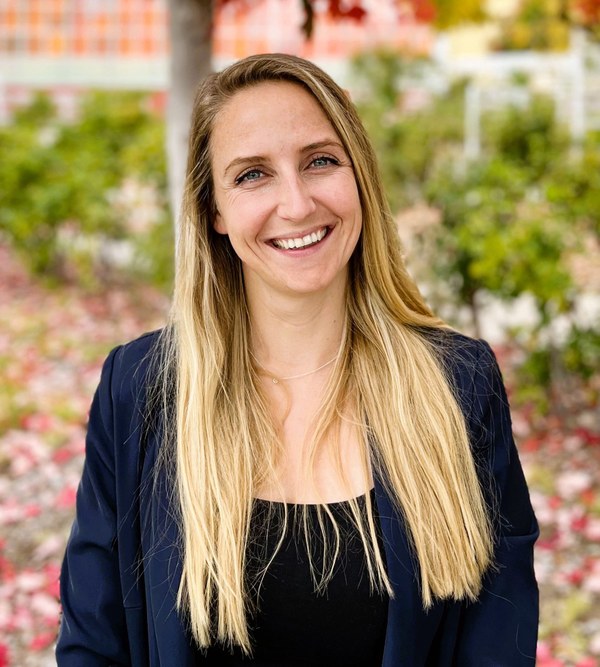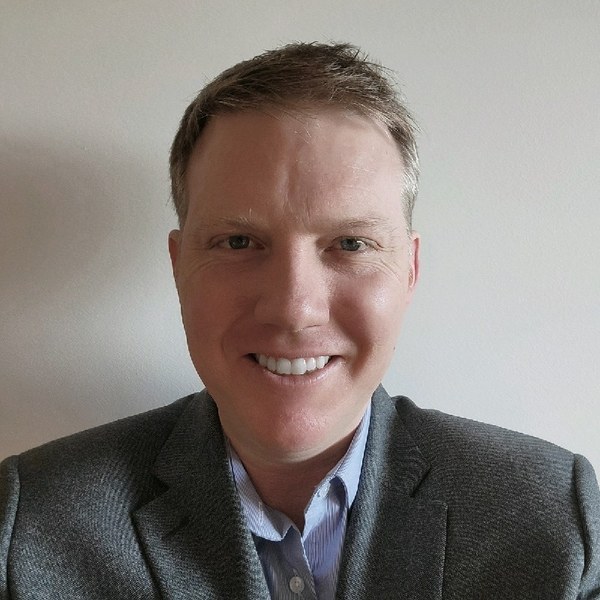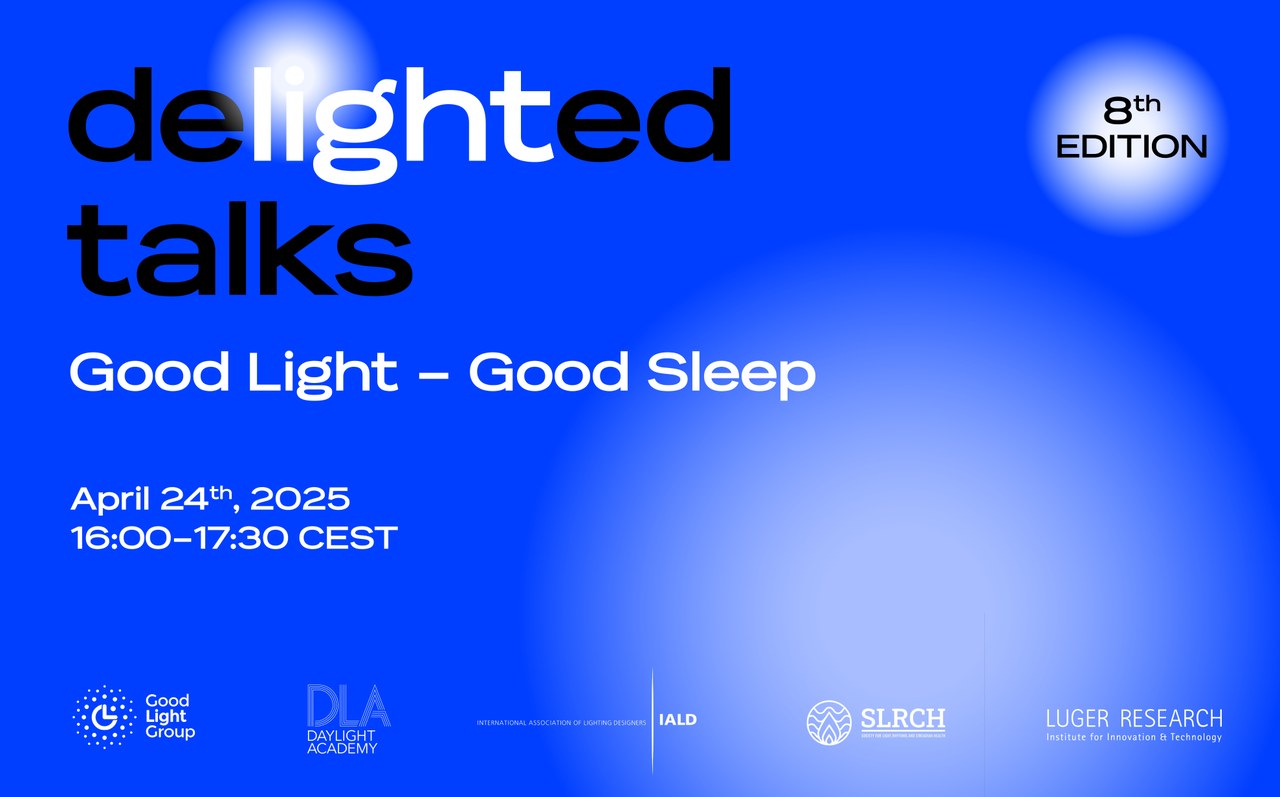deLIGHTed Talks: Good Light – Good Sleep | April 24th, 2025 (4PM CEST)
Learn how light affects your sleep in presentations by Dr. Renske Lok and Dr. Jeffrey Hubbard and moderated by Dr. Virginie Gabel.
In our fast-paced, technology-driven world, where artificial light dominates our environments, the relationship between light and sleep has never been more critical. Exposure to the right type of light at the right time is essential for regulating our circadian rhythms—the internal clock that governs sleep and wakefulness. Insufficient light exposure in the morning or excessive light in the evening can disrupt sleep, impair alertness, and reduce productivity during the day. Join us as we explore how good light can optimize melatonin production, support restful nights, and enhance overall well-being.
>>> REGISTER FOR THIS EVENT HERE <<<
April 24th, 2025 (4PM CET)
MODERATION

Dr. Gabel’s research has also extended to field studies, exploring human adaptation to extreme environments such as deserts, jungles, caves, and snowy terrains. As an associate researcher at the University of Caen in Normandy, France, she investigated how these unique settings impact sleep and circadian rhythms.
In addition to her academic work, Dr. Gabel is the founder of Clock&Me, a consulting firm dedicated to helping organizations prevent occupational risks associated with sleep deprivation and circadian misalignment. Through training programs, seminars, and consultancy, she provides tailored solutions to enhance workplace well-being and productivity.
Dr. Gabel is deeply committed to science communication. While in the Bay Area, she coordinated the U.S. national nonprofit organization Taste of Science, which aimed to bring science into local communities and foster public engagement with scientific research. Today, she actively engages with students across age groups through classroom interventions to raise awareness about the importance of sleep, particularly focusing on the impact of screen use on their daily lives.
PRESENTERS

Her research, supported by prestigious grants such as the NIH K99/R00 award and funding from the American Academy of Sleep Medicine, investigates the mechanisms underlying sleep-wake fragmentation and aims to develop innovative interventions to enhance sleep consolidation and mitigate cognitive decline in older adults. Dr. Lok’s interdisciplinary approach, integrating neuroscience, psychiatry, and chronobiology, has garnered numerous accolades, including recognition for the best dissertation of the academic year in the Cognitive and Behavioral Neuroscience field for her Ph.D. thesis, entitled: “Grasping light: Mental and physiological responses to illumination”.
As the Vice-President of the Society for Light, Rhythms, and Circadian Health, Dr. Lok is instrumental in advancing the field. Her commitment to science communication is demonstrated through her involvement on the board of advisors for the Center for Environmental Therapeutics and as a science advisor for the Good Light Group. Additionally, Dr. Lok is dedicated to promoting diversity, equity, inclusion, and belonging, exemplified by her role as a mentor for local community college students with an interest in science.
Talk: How daytime light exposure shapes nighttime sleep quality.
Abstract: Light is more than just a visual stimulus—it plays a fundamental role in regulating various physiological and behavioral processes beyond vision. These non-image-forming effects include maintaining alertness, enhancing cognitive performance, and regulating melatonin production. While many people recognize the importance of light for wakefulness, its impact on sleep is often overlooked.
Sleep is fundamental to overall health and well-being, playing a critical role in immune function, cognitive performance, and emotional regulation. Our research, spanning both controlled laboratory experiments and real-world field studies, reveals that daytime light exposure has a profound impact on nighttime sleep quality. Specifically, exposure to high-intensity light during the day enhances sleep depth, minimizes nighttime awakenings, and improves overall sleep efficiency. These effects not only promote more restorative sleep but also reduce next-day sleep inertia, leading to greater alertness upon waking.
These findings have important implications for both public health and personalized sleep strategies. Given modern lifestyles, where many individuals spend the majority of their day indoors under artificial lighting, understanding how light exposure shapes sleep can help inform better lighting designs, workplace policies, and behavioral interventions to improve sleep health.

Talk: The opposing forces of light and darkness on sleep and waking behavior: Lessons from nocturnal and diurnal animals.
Abstract: Light is a powerful regulator of sleep and wakefulness in most animals, exerting both acute and sustained effects on these behaviors. Although the influence of light exposure on circadian rhythms is well-characterized, its direct, non-circadian effects on sleep and waking have been less explored. In fundamental neuroscience, animal models allow for detailed investigations on how light and darkness impact sleep and waking using both nocturnal species, such as laboratory mice, and day-active species, such as the Sudanian grass rat, Arvicanthis ansorgei. This talk will explore how light—and darkness—modulate sleep and wakefulness through direct effects on distinct neurobiological systems and can reshape sleep/wake architecture. By comparing the effects in these two species, we can examine how the same environmental cues can produce divergent behavioral and physiological responses, depending on the temporal niche of the animal. As artificial lighting increasingly blurs the boundaries between day and night in our societies, uncovering how exposure to light shapes fundamental biological processes is crucial. By deepening our insight as to whether light can support or disrupt natural sleep in these animals, this provides context as to how we consider our living circumstances in a world that is never completely in darkness.
© 2025 Luger Research e.U. – Institute for Innovation & Technology

